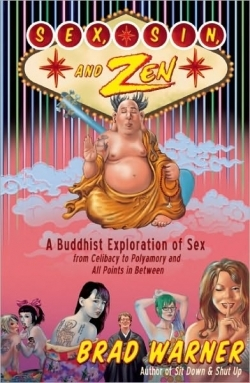Sex, Sin, and Zen
A Buddhist Exploration of Sex from Celibacy to Polyamory and Everything in Between
With chapter titles like “Ouch! Mind Where You Put That Thing!: Sex and Mindfulness” and “Filling the Void—If You Know What I Mean: Sex and Emptiness,” it’s clear from page one that Brad Warner’s latest book is aimed at readers who can tolerate candor and a little levity along with their hanky panky. It is in this spirit that the author, a twenty-year Zen practitioner, flings open the bedroom door and flicks on the lights with a modern, Buddhist perspective on sexuality.
While Warner is very much a twenty-first-century American, his insights on sexuality are informed by the Japanese tradition in which he trained and was eventually ordained; specifically, he notes that sex is not a matter of morality, nor do Buddhists subscribe to the concept of sin. Simply put, the Asian “attitude toward sex has always been freer—or at least lighter—than the Western one.” Unpacking the attitudinal and functional differences between these cultures with respect to sex is an especially fascinating facet of Warner’s text. In his discussion of sex work and stripping, for example, he writes “…American culture has been shaped tremendously by the puritan view of sex and nudity as evil. Neither of these ideas is present in Buddhism.” In any case, this book is elbow-deep in gritty questions about how to function sensibly and ethically in our sex lives.
The author of several other books, among them Hardcore Zen and Zen Wrapped in Karma Dipped in Chocolate, Warner found Zen while playing bass in punk bands in Ohio. He went on to live in Japan for eleven years, where he practiced zazen (sitting meditation) and studied Buddhism. Remaining true to some of that original punk rock essence, he infuses his teachings with an appealing edginess that is both skeptical and compassionate. He is not speaking from “on high” and has real life experiences of his own to draw on during the discussion, making an offering both philosophical and practical.
Foundational to Warner’s thinking on the subject are two particular Buddhist ideas. First, the concept of the “Middle Way” teaches that individuals should aim for moderation rather than excess in all things. Second, there is a Buddhist precept which encourages men and women “not to misuse sexuality” which, Warner is careful to point out, does not insist on abstinence but rather urges mindfulness in all matters pertaining to sexuality, and in whatever form they are practiced. Simply put, unbalanced and destabilizing behaviors are discouraged: “[F]or Buddhists, anything you do that harms yourself is also a kind of violation of the moral Rule of the Universe.” By this, Warner seems to mean that society and, indeed, the world, function best when everyone is behaving reasonably, and with one’s whole health and welfare in mind. In Buddhism, sex is fine, sex is good, but only if it is fine and good; as soon as a partner is disrespected or harmed in any way, it is likely that some reorientation is in order. Sexuality, per se, is not seen as bad or evil or even indecent; rather, it is a fact of life for most human beings and therefore deserves not to be dismissed or demonized, least of all by sincere spiritual teachers and seekers.
Some readers may find a few too many silly jokes and saucy asides in this book, but in each case, the point seems to be to put the reader at ease. Above and beyond that, Warner’s fundamental observations and work of weaving historical Buddhist teachings into the discussion are thoughtful, interesting, and amount to a stimulating and indeed, practical book for not just Buddhists, but anyone who is trying to make sense of sex in a complicated world.
To read Warner is to put aside preconceptions about who a Buddhist is or could be, and to discover that sexuality need not be shrouded in taboo or dismissed as a less than enlightened aspect of a complete human being. Readers will likely warm to the author’s sensibility—his reluctant, if also genuine commitment to the ethos of Zen—and find that his perspective is one not easily found elsewhere in American culture, much less among spiritual teachers of any persuasion. A survey of the literature suggests that this book is unlike any other on the subject and will be worth the attention of anyone interested in what an American Buddhist teacher thinks about dating, sex, abortion, marriage, pornography, open relationships, and even prostitution.
Reviewed by
Holly Wren Spaulding
Disclosure: This article is not an endorsement, but a review. The publisher of this book provided free copies of the book to have their book reviewed by a professional reviewer. No fee was paid by the publisher for this review. Foreword Reviews only recommends books that we love. Foreword Magazine, Inc. is disclosing this in accordance with the Federal Trade Commission’s 16 CFR, Part 255.

